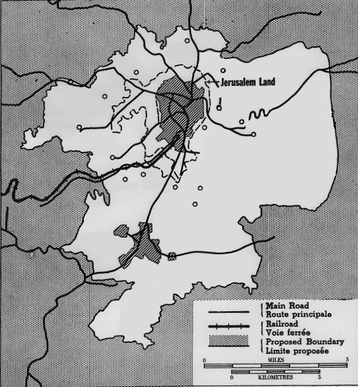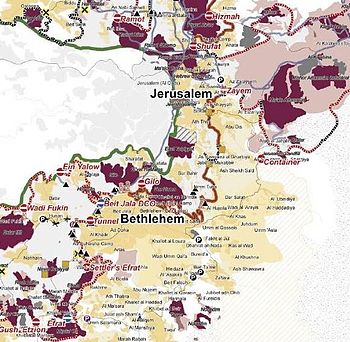- Corpus separatum (Jerusalem)
-

United Nations Partition Plan for Palestine
Jerusalem Corpus Separatumat-TurSharafatal-Malihaal-'IsawiyaCorpus separatum (Latin for "separated body") is used with regard to Jerusalem according to the 1947 UN Partition Plan which used it to refer to a proposed internationally administered zone to include Jerusalem in the 1947 municipal boundaries "plus surrounding villages and towns, the most eastern of which shall be Abu Dis; the most southern, Bethlehem; the most western Ein Karem (including also the built-up area of Motsa); and the most northern Shu'fat." (Part III (B)) The special status for the city was because "of its association with three world religions". It was to be "under a special international regime and shall be administered by the United Nations". (Part III (A))
United Nations General Assembly Resolution 194, 11 December 1948 established a United Nations Conciliation Commission and reaffirmed this statement. United Nations General Assembly Resolution 303 confirmed the decision to place Jerusalem under a permanent international regime according to the 1947 UN Partition Plan.
The Partition Plan was accepted by the Jewish Palestinians, but was rejected by the Arab Palestinians as well as by other Arab nations, six of which attacked Israel after it declared statehood[citation needed]. The Plan was never implemented. At the end of the 1948-49 War, under the Armistice Agreement, an Armistice Demarcation Line was drawn, with Western Jerusalem under Israeli occupation[1], together with the whole West Bank, controlled by Transjordan. Following the Six-Day War of 1967, Israel also gained military control of East Jerusalem[2] and the West Bank, and unlawfully annexed east Jerusalem to Israel[3]. Jerusalem became a unified municipality. The present municipal boundaries of Jerusalem are not the same as those of the corpus separatum set out in the Partition Plan, and do not include Bethlehem.
Contents
Later status of Jerusalem
Further information: Positions on JerusalemThe Israeli Knesset passed a Jerusalem Law declaring united Jerusalem to be Israel's capital in 1980, although the clause "the integrity and unity of greater Jerusalem (Yerushalayim rabati) in its boundaries after the Six-Day War shall not be violated" was dropped from the original bill. United Nations Security Council Resolution 478 condemned this and no countries today have located their embassies in Jerusalem; however, Bolivia and Paraguay have their embassies in Mevaseret Zion, a suburb 10 km west of Jerusalem.
On October 23, 1995, the United States Congress passed the advisory Jerusalem Embassy Act saying that "Jerusalem should be recognized as the capital of the State of Israel; and the United States Embassy in Israel should be established in Jerusalem no later than May 31, 1999". Since 1995, the relocation of the embassy from Tel Aviv has been suspended by the President semi-annually, each time stating that "[the] Administration remains committed to beginning the process of moving our embassy to Jerusalem". Since the US Congress does not control US foreign policy, despite the Embassy Act, official U.S. documents and web sites do not refer to Jerusalem as the capital of Israel.
The European Union continues to support the internationalisation of Jerusalem in accordance with the 1947 UN Partition Plan and regards Jerusalem as having the status of corpus separatum .[4]
The Holy See has previously expressed support for the status of corpus separatum. Pope Pius XII was the among the first to make such a proposal in the 1949 encyclical Redemptoris Nostri Cruciatus. This idea was later re-proposed during the papacies of John XXIII, Paul VI and John Paul II.
See also
- Positions on Jerusalem
- UN General Assembly Resolution 194, (1948)
- United Nations Conciliation Commission, (1949)
References
- ^ Israel Ministry of Foreign Affairs "On 2 August, the Government of Israel rejected the suggestion and decided to declare the Jerusalem area under its control as Israel-occupied territory"
- ^ The politics of Jerusalem since 1967 - Page 42"Despite full military control and the assertion of total Israeli sovereignty over the whole of Jerusalem"
- ^ United Nations International Meeting on the Question of Palestine. United Nations, 2005"the unilateral annexation of East Jerusalem is unlawful (Security Council resolution 252(1968)"
- ^ Foundation for Middle East Peace – May 1999: "Europe Affirms Support for a Corpus Separatum for Greater Jerusalem"
External links
Categories:- Jerusalem
- Israeli–Palestinian peace efforts
- History of Israel
- History of Palestine
- Corpus separatum
Wikimedia Foundation. 2010.


